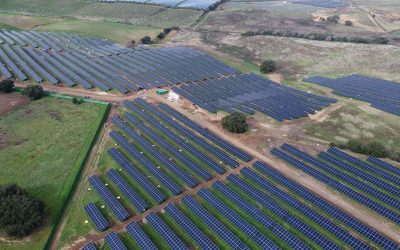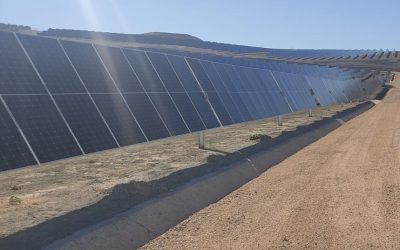BNZ, an independent power producer (IPP) that develops, builds and operates solar photovoltaic (PV) projects, inaugurated on Tuesday its Alya and Alamak PV plants, located in the municipality of Alcalá de los Gazules, in the province of Cádiz (Andalusia, Spain), with a total capacity of 74 MW.
This is the first plant inaugurated by BNZ in Spain, where it expects to install around 600 MWp of capacity by 2026. In total, BNZ plans to deploy a portfolio of more than 1.7 GW of solar PV in Southern Europe by the end of 2026.
The clean energy produced by these two solar plants will meet the annual electricity needs of almost 25% of the city of Cadiz and will also avoid the emission of 39,031 tonnes of CO2 per year, the equivalent of around 64,800 return flights between Seville and Rome.
In this sense, as an example of the positive economic impact of the facilities on the local community, BNZ has created between 560 and 580 direct and indirect jobs and has worked with a total of 17 local companies.
BNZ Managing Director Luis Selva said: “The inauguration of this solar plant is not only a significant milestone, but also the beginning of a great adventure towards a more sustainable future. This project is just the beginning of our commitment to renewable energy and sustainable development.”
Jordi Francesch, Head of Asset Management and Chief Risk Officer of Nuveen Infrastructure, BNZ’s parent company, said: “We are particularly pleased to invest in the construction of these photovoltaic plants in Alcalá de los Gazules, which demonstrates our commitment to renewable energy generation in Cádiz, Andalusia, Spain and Southern Europe.”
Cesar Moreyra, General Manager of Grupotec, the company responsible for the construction of the plant, pointed out that “we are proud to inaugurate this photovoltaic park, which we have developed over many years and which is an example of integration with this beautiful landscape. With this project, we will generate more than 160 GWh per year of CO2-free electricity for the Andalusian grid, which will allow us to achieve greater sustainability and reduce our dependence on fossil fuels”.
For her part, Inmaculada Olivero, Cádiz’s Territorial Delegate for Economy, Finance and European Funds and for Industry, Energy and Mines, said that “in Andalusia we have a target of 26,000 MW of renewable energy capacity, and more than half of this has already been installed. The province of Cádiz has 17% of all renewable generation in Andalusia, only behind Seville, and we continue to take important steps”.
Javier Pizarro, Mayor of Alcalá de los Gazules, added: “This is an important commitment to renewable energy, and from Alcalá we understood that we had to take advantage of the capacity that compatible land with renewable energy gives us. The environmental and economic impact will benefit every single resident of Alcalá.”
Two projects promoting wildlife and biodiversity
In its commitment to the environmental and social progress of local communities and beyond meeting the highest environmental criteria, BNZ has collaborated with local authorities on environmental projects to find the greatest compatibility between clean energy generation and the promotion of wildlife and biodiversity at solar plants.
Therefore, BNZ has adopted sustainability initiatives that include the implementation of permeable structures with vegetated walls to facilitate wildlife passage and ensure ecological connectivity, as well as the construction of mounds and the planting of trees and hedges around the plant with native species such as mastic tree, wild olive, holm oak, and dwarf palm.
In this regard, grazing routes like the Cañada Real have also been preserved and improved, a crossing point on the riverbank has been restored with native species such as tamarisk and oleander, measures have been taken to attract species such as wild rabbits, and monitoring has been deployed to preserve bird species like the Spanish imperial eagle and the red kite. Additionally, feeders, water sources, shelters, perches, and nest boxes for birds, bats, and insects have been installed.
Lastly, BNZ has also combined solar energy production with agricultural crops by implementing agrivoltaics in the project. This initiative helps improve soil quality by reducing water evaporation and protects crops from excess heat through the shade provided by solar panels.


